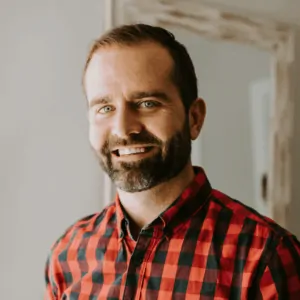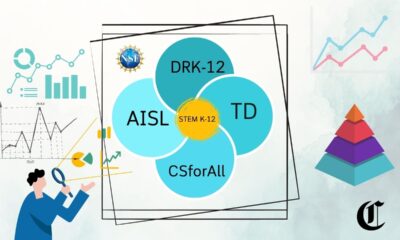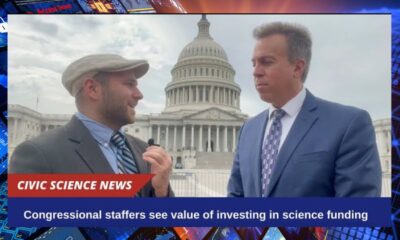Civic Science Observer
Thinking bigger and learning everything with Galactic Polymath

We recently caught up with Dr. Matt Wilkins (MW), the Founder and CEO of an education studio called Galactic Polymath (GP), to chat about his organization and its mission.
CST: In your own words, what does Galactic Polymath do? How does it make a difference?
MW: Galactic Polymath (GP) translates complex knowledge into rigorous, engaging lessons for grades 5-12 that are free for teachers. Our lessons are creative, data-centered, and memorable. We aim to make educational outreach easier and more impactful for government-funded researchers, nonprofits, and sustainable brands. In addition, by funding lesson development on the production side to achieve the outreach aims of our clients, we seek to raise the bar for interdisciplinary education while increasing equitable access to learning content. Our end goal is for every G5-12 classroom to access cutting-edge knowledge and learning experiences that are currently only available to select undergrad, graduate students, and professional scientists.
CST: How did this idea come to mind?
MW: Galactic Polymath is a project borne out of frustration and informed by my experience as a biologist and middle school educator. Throughout my graduate school career and into my first three-year postdoc, I constantly sought ways to transmit knowledge to the general public. I ended up organizing informal science events and workshops to support K-12 teaching of “controversial” topics (like evolution), blogging about my research, creating an outreach website and associated social media presence (Numbat Media), making scicomm videos, creating and running a Nebraska chapter of Nerd Nite, and even founding the No Coast SciComm Conference. Every step of the way, I felt like I was building something from scratch (as were all the other academics around me). In particular, in organizing the SciComm conference. I was surprised at how many similar initiatives existed on the same campus and were essentially trying to do the same thing, yet did not know each other. We often try to construct our own scicomm projects and build an audience from nothing but scientists have many other duties. We eventually have to neglect the project and lose much or all of our progress. Even worse, the audience we have at our disposal is often the already-science-engaged (because they’re the ones who come to museum days and nerdy events). There is no real infrastructure we can tap into to convey our knowledge or our optimistic messages to K-12 classrooms– the very environments most suited to receive them. Classrooms are where students go to learn about the world and how they fit into it and where a vast proportion of our society, at some point, feels turned away from STEM.
I began a career pivot around 2016 and decided I wanted to learn more about how to bridge the gap between Academia and K-12 classrooms – to understand why there isn’t already a clear conduit mobilizing new knowledge for students hungry to learn about the world and see their classwork applied to solving real-world problems. This led me to a 3.5-year postdoc with Vanderbilt’s Collaborative for STEM Education and Outreach. I was a Resident Scientist on-site at a Nashville middle school five days a week, teaching, developing curriculum, and getting a thorough grounding in the challenges of modern K-12 education.
My dual experiences as a researcher and a middle school educator informed my decision to start Galactic Polymath and dedicate myself full time to connecting these two worlds.
CST: What was the process like creating this platform?
MW: I worked behind the scenes for years, informing myself about the day-to-day needs, expectations, and constraints of teachers; networking; learning about how to run a business, and a million other small things that graduate education in science left me unprepared for when making a jump into entrepreneurship. One of the enduring challenges is building and maintaining a custom website (not a Weebly or WordPress site) that is responsive (looks good on any device), fast, and affordable for an early-stage, self-funded operation. Every step of the way is challenging, from building and managing a team to implementing project management systems to creating legal documents and contracts, and/while avoiding decision paralysis. But the important thing is to celebrate each small win, be persistent, and keep connecting with new people. Bit by bit, I’ve seen my vision for this company begin to take shape, and I’m very excited about what this year will bring.
CST: How does Galactic Polymath stand out from other platforms? What makes it unique?
MW: GP distinguishes itself from other education companies in numerous ways. First and foremost, we are founded by scientists and teachers to connect scientists and teachers. But we are also pioneering a new model for funding education curriculum on the production side (to achieve outreach), which incentivizes free and wide distribution of materials (the opposite of how education is usually created and published through end-user purchases and subscriptions). We have also created a streamlined lesson delivery system that is light-years ahead of how lessons are typically shared by creating an entire workflow that focuses on crafting rigorous, interdisciplinary lessons that align with ELA, math, science, and social studies standards. This provides deeper learning by highlighting the connections between concepts within and across subjects. Our approach also involves developing lesson-relevant puzzles that deepen student engagement and thoughtfully crafting storylines around compelling narratives to provide memorable learning experiences. We’re essentially using our whole experience as scientists, science communicators, and teachers to provide the rich learning experiences we would’ve wanted growing up.
CST: What advice do you have for others looking to break into the field?
Do your research. Before you start building, make sure someone else isn’t already doing it. If someone is, see if you can collaborate or even merge projects. Even if you don’t end up collaborating, it is essential to understand the landscape you fit into fully. Also, identify your unique value proposition, your audience—and if you’re starting a business—a great number of other things you’re taught not to think about in grad school (like the value of your time). Be persistent (because Rome wasn’t built in a day and the status quo has a strong pull), but also seek perspectives of people who’ve been working in the field for a long time. Sometimes it’s not been done the way you imagine for reasons that you should at least consider.
You can learn more about Galactic Polymath at galacticpolymath.com. Make sure to subscribe to their emails to stay on top of the latest free lesson releases and follow them on Twitter at @galacticPM.
The CS Media Lab is a Boston-anchored civic science news collective with local, national and global coverage on TV, digital print, and radio through CivicSciTV, CivicSciTimes, and CivicSciRadio. Programs include Questions of the Day, Changemakers, QuickTake, Consider This Next, Stories in Science, Sai Resident Collective and more.

-
 Audio Studio1 month ago
Audio Studio1 month ago“Reading it opened up a whole new world.” Kim Steele on building her company ‘Documentaries Don’t Work’
-
Civic Science Observer1 week ago
‘Science policy’ Google searches spiked in 2025. What does that mean?
-
Civic Science Observer1 month ago
Our developing civic science photojournalism experiment: Photos from 2025
-
Civic Science Observer1 month ago
Together again: Day 1 of the 2025 ASTC conference in black and white
Contact
Menu
Designed with WordPress

























